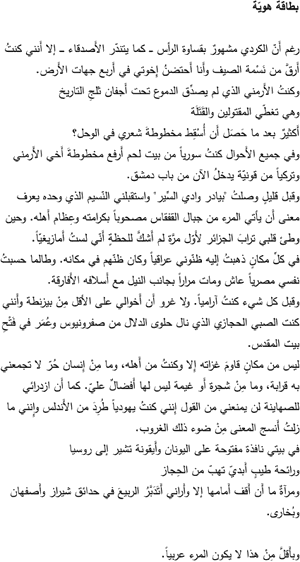IDENTITY CARD
Despite—as my friends joke—the Kurds being famous for their severity, I was gentler than a summer breeze as I embraced my brothers in the four corners of the world.
And I was the Armenian who did not believe the tears beneath the eyelids of history’s snow
that covers both the murdered and the murderers.
Is it so much, after all that has happened, to drop my poetry in the mud?
In every case I was a Syrian from Bethlehem raising the words of my Armenian brother, and a Turk from Konya entering the gate of Damascus.
And a little while ago I arrived in Bayadir Wadi al-Sir and was welcomed by the breeze, the breeze that alone knew the meaning of a man coming from the Caucasus Mountains, his only companions his dignity and the bones of his ancestors.
And when my heart first tread on Algerian soil, I did not doubt for a moment that I was an Amazigh.
Everywhere I went they thought I was an Iraqi, and they were not wrong in this.
And often I considered myself an Egyptian living and dying time and again by the Nile with my African forebears.
But above anything I was an Aramaean. It is no wonder that my uncles were Byzantines, and that I was a Hijazi child coddled by Umar and Sophronius when Jerusalem was opened.
There is no place that resisted its invaders except that I was of one its people; there is no free man to whom I am not bound in kinship, and there is no single tree or cloud to which I am not indebted. And my scorn for Zionists will not prevent me from saying that I was a Jew expelled from Andalusia, and that I still weave meaning from the light of that setting sun.
In my house there is a window that opens onto Greece, an icon that points to Russia, a sweet scent forever drifting from Hijaz,
and a mirror: No sooner do I stand before it than I see myself immersed in springtime in the gardens of Shiraz, and Isfahan, and Bukhara.
And by anything less than this, one is not an Arab.
